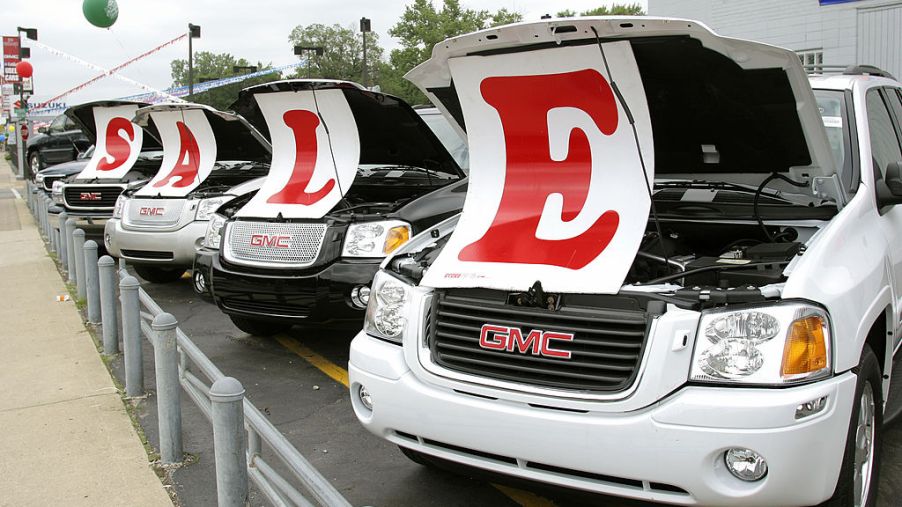
Beware of Outdated Used Car Buying Advice
The process of buying a used car can be a bit more tricky than that of buying a new one. There are many <a href="https://
The process of buying a used car can be a bit more tricky than that of buying a new one. There are many quality, pre-owned vehicles available. It just takes a little time and patience to locate them. The right strategy also helps immensely.
Thanks to popular media outlets like Jalopnik, CNBC, and Yahoo Finance, we’ve put together a reliable list of the top three solid used car buying tips. Use these tips to make your next search efficient and successful.
About those vehicle history reports
Many shoppers swear by CarFax and other vehicle history report services to get important information. These reports will provide information on a given vehicle’s maintenance history and give details on any accidents it has been in. Such information can help you decide whether you wish to buy a car you’re considering.
While many rely on these reports, they aren’t always entirely accurate. The reports have turned up on occasion with inaccurate or missing information. On occasion, accidents aren’t reported so they don’t make it on these reports. Sometimes a given vehicle had more owners than appear on the report, particularly if sold from one dealer to another.
The 17-digit VIN number each car has allows you to access a vehicle history report which cost around $40.
While the reports certainly provide information about a vehicle you’re interested in buying, you should be able to easily access them. You also shouldn’t have to pay for them. When researching a vehicle, keep in mind that most dealerships have such reports linked to their advertisements. If a dealer doesn’t do that, proceed with caution.
Always request a copy of the vehicle history report from the dealer.
Ask about the inspection process
Many dealers want to sell good, quality pre-owned vehicles. Some just want to turn a profit. All dealers will tell you that the used vehicle you’re considering has been fully inspected and reconditioned before offering it for sale. What’s the truth?
To find out, an expert from CNBC recommends that you ask where the vehicles are inspected. Also, ask to see where the technicians are working on the vehicles.
It’s recommended that you have a vehicle independently inspected outside the dealership. While some used vehicles are labeled "certified pre-owned" and supposedly meet certain standards as such, it’s important to have an unbiased expert opinion. Dealership technicians can overlook details and some dealers aren’t as strict on the certification process.
You may run into resistance for such a request. Some dealers may not want to send their cars out for an independent inspection. It doesn’t necessarily mean that there’s a problem with the car. Just maybe the dealership doesn’t want the hassle. If so, keep in mind there are remote services you can use who will send professionals to the dealership for inspection and reporting purposes.
The negotiation game
Don’t negotiate with the dealer in person. Your time and energy can be put to better use.
James Goodnow, Managing Partner and President of Fennemore Craig, P.C., told Yahoo Finance that you should make the first offer to anchor the parameters of the negotiation. Since dealers don’t want to bid against the prices they’ve set, he said not to be afraid of making an offer at or below the dealer’s invoice price. Goodnow, an attorney, said to expect some back and forth dealing before the dealer gives his final offer.
In truth, there’s no dealer invoice price for used cars. Invoices are what dealers pay the automakers for new cars. Some dealers get their used cars at auctions. Some they get through trade-ins. What the dealer paid for its acquisition is irrelevant. All that matters is what they’ll sell it for.
When you make a low-end offer, you may meet resistance. The margins on used vehicles are tighter than you might guess. If you can find a similar vehicle available for less, you may be able to use that as a bargaining tool.
Negotiations don’t have to take place in person. You can use emails or phone calls to get a price and make sure it’s completely itemized so you know exactly what you’re getting. Some dealers add vague, unnecessary fees to the bill to pad it.
Researching pre-owned vehicles can take a lot of effort and be a bit stressful at times. Vehicle history report vendors are popular because they do a measure of the work for the buyer. But if value means more to you than convenience, it may be best to handle the vehicle research yourself with the help of the dealer.
“>quality, pre-owned vehicles available. It just takes a little time and patience to locate them. The right strategy also helps immensely.Thanks to popular media outlets like Jalopnik, CNBC, and Yahoo Finance, we’ve put together a reliable list of the top three solid used car buying tips. Use these tips to make your next search efficient and successful.
Vehicle History Reports
Many shoppers swear by CarFax and other vehicle history report services to get important information. These reports will provide information on a given vehicle’s maintenance history and give details on any accidents it has been in. Such information can help you decide whether you should go through with buying a used car you’ve been considering.
While many rely on these reports, they aren’t always entirely accurate. The reports have turned up on occasion with inaccurate or missing information. On occasion, accidents aren’t reported so they don’t make it on these reports. Sometimes a given vehicle had more owners than appear on the report, particularly if sold from one dealer to another.
The 17-digit VIN number each car has allows you to access a vehicle history report, which cost around $40.
While the reports certainly provide information about a vehicle you’re interested in buying, you should be able to easily access them. You also shouldn’t have to pay for them. When researching a vehicle, keep in mind that most dealerships have such reports linked to their advertisements. If a dealer doesn’t do that, proceed with caution.
Always request a copy of the vehicle history report from the dealer.
Pre-Purchase Inspection
Many dealers want to sell good, quality pre-owned vehicles. Some just want to turn a profit. All dealers will tell you that the used car you’re considering has been fully inspected and reconditioned before offering it for sale. What’s the truth?
To find out, an expert from CNBC recommends that you ask where the vehicles are inspected. Also, ask to see where the technicians are working on the vehicles.
It’s recommended that you have a vehicle independently inspected outside the dealership. While some used cars are labeled “certified pre-owned” and supposedly meet certain higher standards, it’s important to have an unbiased expert opinion. Dealership technicians can overlook details, and some dealers aren’t as strict on the certification process because they know buying a used car can be hit or miss.
You may run into resistance for such a request. Some dealers may not want to send their cars out for an independent inspection. It doesn’t necessarily mean that there’s a problem with the car. Just maybe the dealership doesn’t want the hassle. If so, keep in mind there are remote services you can use who will send professionals to the dealership for inspection and reporting purposes.
Negotiating When Buying a Used Car
Don’t negotiate with the dealer in person. Your time and energy can be put to better use.
James Goodnow, Managing Partner and President of Fennemore Craig, P.C., told Yahoo Finance that you should make the first offer to anchor the parameters of the negotiation. Since dealers don’t want to bid against the prices they’ve set, he said not to be afraid of making an offer at or below the dealer’s invoice price. Goodnow, an attorney, said to expect some back and forth dealing before the dealer gives his final offer.
In truth, there’s no dealer invoice price for used cars. Invoices are what dealers pay the automakers for new cars. Some dealers get their used cars at auctions. Some they get through trade-ins. What the dealer paid for its acquisition is irrelevant. All that matters is what they’ll sell it for.
When you make a low-end offer, you may meet resistance. The margins on used vehicles are tighter than you might guess. If you can find a similar vehicle available for less, you may be able to use that as a bargaining tool.
Negotiations don’t have to take place in person. You can use emails or phone calls to get a price and make sure it’s completely itemized so you know exactly what you’re getting. Some dealers add vague, unnecessary fees to the bill to pad it.
Researching pre-owned vehicles can take a lot of effort and be a bit stressful at times. Vehicle history report vendors are popular because they do a measure of the work for the buyer. But if value means more to you than convenience, it may be best to handle the vehicle research yourself with the help of the dealer.


